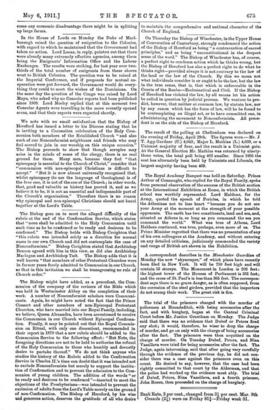The Bishop might have added, as a precedent, the Com-
munion of the company of the revisers of the Bible which was held in Westminster Abbey on the completion of their work. A number of Nonconformist scholars were Communi- cants. Again, he might have noted the fact that the Prince Consort and other members of non-Episcopal Protestant Churches, who have married into our Royal Family, including, we believe, Queen Alexandra, have been accustomed to receive the Communion in our Church without Episcopal Confirma- tion. Finally, it may be pointed out that the Royal Commis- sion on Ritual, with only one dissentient, recommended in their report in 1870 that a new rubric should be added to the Communion Service to the following effect : "But Note, the foregoing directions are not to be held to authorise the refusal of the Holy Communion to those who humbly and devoutly desire to partake thereof." We do not think anyone who studies the history of the Rubric added to the Confirmation Service in Charles II.'s time can doubt that it was intended not to exclude Nonconformists but merely to support the institu- tion of Confirmation and to prevent the admission to the Com- munion of young children. The addition of the words "or be ready and desirous to be confirmed "—inserted to meet the objections of the Presbyterians—was intended to prevent the exclusion of adults from the Lord's Table merely on the ground of non-Confirmation. The Bishop of Hereford, by his wise tad generous action, deserves the gratitude of all who desire to maintain the comprehensive and national character of the Church of England.










































 Previous page
Previous page